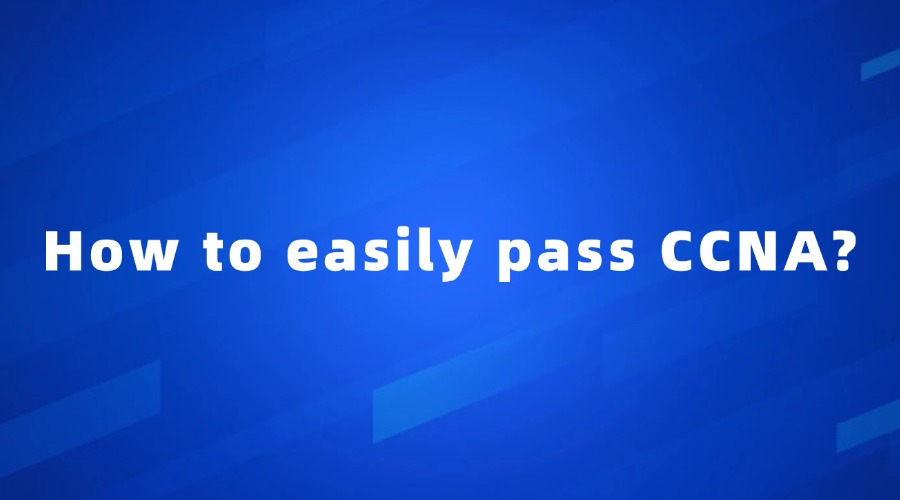What is 200-301 in CCNA?
Update time:2024-11-02
The CCNA 200-301 exam is Cisco’s most recent certification test for the Cisco Certified Network Associate (CCNA), one of the most sought-after certifications in the IT networking field. The 200-301 exam is designed to validate a candidate’s ability to install, configure, and troubleshoot small to medium-sized networks, along with their knowledge of network fundamentals, automation, and security essentials.

In this article, we’ll explain what the 200-301 CCNA exam entails, its importance, and how candidates can prepare for it.
1. Overview of the CCNA 200-301 Exam
The 200-301 CCNA is a single, comprehensive exam that covers a wide range of networking concepts, from basic IP addressing to more advanced topics like automation and network security. Unlike the previous CCNA certification, which required multiple exams for different specializations (such as routing and switching, security, or wireless), the 200-301 CCNA consolidates these areas into one exam.
Here’s an overview of the exam:
Exam Name: Implementing and Administering Cisco Solutions (CCNA 200-301)
Duration: 120 minutes
Number of Questions: Approximately 100-120 questions, depending on the specific version of the exam.
Exam Cost: $300 (USD) at the time of writing, though pricing may vary by region.
Question Types: The exam includes multiple-choice questions, drag-and-drop questions, and simulation-based questions that test hands-on skills.
The 200-301 CCNA is designed for those entering the field of networking or IT professionals who want to broaden their skill set. It’s aimed at verifying foundational skills in networking, which are essential for a wide variety of IT roles.
2. Exam Topics
The CCNA 200-301 exam covers a broad spectrum of networking topics, ensuring candidates have a holistic understanding of networking concepts. These topics are divided into several key areas:
2.1 Network Fundamentals
This section tests candidates' knowledge of the basic components of networks, including:
OSI and TCP/IP Models: Understanding how data is transferred across different layers of a network is essential. The exam will test your knowledge of these models.
Ethernet and Switching Concepts: The CCNA 200-301 covers how switches work and their role in creating and maintaining networks.
IP Addressing and Subnetting: Understanding IPv4 and IPv6 addressing, how subnetting works, and how to implement IP addressing in a network.
2.2 Network Access
The network access section focuses on how devices connect to networks and how data is transferred across local area networks (LANs). Key areas include:
VLANs (Virtual Local Area Networks): These are used to segment networks and manage traffic more efficiently.
Switch Configuration: Candidates must understand how to configure and manage switches in a network.
Wireless Networking: Basic knowledge of wireless technologies and security protocols is also included in this section.
Contact me immediately to get the golden key helping you fast express your certificate. 2.3 IP Connectivity
This section addresses how different networks communicate with each other:
Routing Concepts: You will need to understand how routers work and how routing protocols such as OSPF (Open Shortest Path First) operate.
Static and Dynamic Routing: The exam will test your knowledge of configuring both static routes (manually entered) and dynamic routing protocols that update automatically.
2.4 IP Services
IP services are essential to the proper functioning of a network. Some of the key concepts tested in this section include:
DHCP (Dynamic Host Configuration Protocol): Used to automatically assign IP addresses to devices on a network.
NAT (Network Address Translation): NAT allows private IP addresses to connect to public networks like the internet.
DNS (Domain Name System): DNS is used to translate domain names (like www.example.com) into IP addresses.
2.5 Security Fundamentals
As network security is a critical aspect of modern networks, the 200-301 CCNA includes several security-related topics:
Access Control Lists (ACLs): ACLs are used to control who has access to specific parts of a network.
Device Hardening: This involves securing network devices by configuring strong passwords, encryption, and other protective measures.
VPNs (Virtual Private Networks): VPNs allow for secure communication over public networks like the internet.
2.6 Automation and Programmability
In recent years, automation and programmability have become essential in network management, and Cisco has included these topics in the 200-301 exam:
Software-Defined Networking (SDN): This technology separates the control plane from the data plane in a network, making networks more programmable and flexible.
Automation Tools: Basic knowledge of tools like Python, which can be used to automate network configurations, is included in this section.
APIs (Application Programming Interfaces): APIs allow different applications to communicate and automate tasks on the network.
3. Question Types and Exam Format
The 200-301 CCNA exam includes a variety of question types to assess both theoretical and practical knowledge. Some of the key question types include:
Multiple-Choice Questions: These standard questions present a problem and require you to choose one or more correct answers.
Drag-and-Drop Questions: These questions ask you to match terms or concepts to their correct positions in a network diagram.
Simulations: Simulation questions present a hands-on scenario, where you must configure or troubleshoot a network device, such as a router or switch, in a virtual environment.
This variety of question types makes the exam more interactive and practical, testing not only your knowledge but also your ability to apply that knowledge in real-world scenarios.
4. Who Should Take the CCNA 200-301 Exam?
The 200-301 CCNA exam is designed for individuals who are either starting their career in networking or who want to expand their networking skills. This exam is ideal for:
Network Technicians: Professionals who manage or troubleshoot small to medium-sized networks.
System Administrators: Those responsible for managing servers, users, and networks.
IT Support Staff: Individuals working in technical support roles who need to understand networking fundamentals.
Students or Entry-Level Professionals: People looking to break into the IT field and enhance their resume with a recognized certification.
Earning the CCNA certification can open doors to a variety of networking roles and is often a stepping stone for further certifications, such as the Cisco Certified Network Professional (CCNP) or Cisco Certified Internetwork Expert (CCIE).
5. How to Prepare for the CCNA 200-301 Exam
While the CCNA 200-301 exam is comprehensive and challenging, it is manageable with the right preparation. Here are some tips to help you succeed:
Study Guides and Materials: Cisco provides official study guides and learning materials for the CCNA exam. These resources are invaluable for understanding the exam topics in detail.
Hands-On Practice: Practical experience with networking equipment is essential. You can set up a home lab or use network simulators like Cisco Packet Tracer or GNS3 to practice configurations.
Practice Exams: Taking practice exams will help you get familiar with the format of the test and identify areas where you need further study.
Online Communities: Join online forums or study groups where you can share tips, ask questions, and learn from others who are preparing for the exam.
Conclusion
The CCNA 200-301 exam is a comprehensive test that covers a broad range of networking topics, from basic fundamentals to advanced concepts like automation and network security. While it is challenging, it’s a valuable certification for anyone looking to start or advance a career in networking. With the right preparation, hands-on experience, and study resources, you can pass the CCNA exam and earn a certification that will open doors to many opportunities in the IT industry.
I'm your man who have the 100% valid dumps , buy it now for 50% off to clear your exam!
Click it ↓↓

In this article, we’ll explain what the 200-301 CCNA exam entails, its importance, and how candidates can prepare for it.
1. Overview of the CCNA 200-301 Exam
The 200-301 CCNA is a single, comprehensive exam that covers a wide range of networking concepts, from basic IP addressing to more advanced topics like automation and network security. Unlike the previous CCNA certification, which required multiple exams for different specializations (such as routing and switching, security, or wireless), the 200-301 CCNA consolidates these areas into one exam.
Here’s an overview of the exam:
Exam Name: Implementing and Administering Cisco Solutions (CCNA 200-301)
Duration: 120 minutes
Number of Questions: Approximately 100-120 questions, depending on the specific version of the exam.
Exam Cost: $300 (USD) at the time of writing, though pricing may vary by region.
Question Types: The exam includes multiple-choice questions, drag-and-drop questions, and simulation-based questions that test hands-on skills.
The 200-301 CCNA is designed for those entering the field of networking or IT professionals who want to broaden their skill set. It’s aimed at verifying foundational skills in networking, which are essential for a wide variety of IT roles.
2. Exam Topics
The CCNA 200-301 exam covers a broad spectrum of networking topics, ensuring candidates have a holistic understanding of networking concepts. These topics are divided into several key areas:
2.1 Network Fundamentals
This section tests candidates' knowledge of the basic components of networks, including:
OSI and TCP/IP Models: Understanding how data is transferred across different layers of a network is essential. The exam will test your knowledge of these models.
Ethernet and Switching Concepts: The CCNA 200-301 covers how switches work and their role in creating and maintaining networks.
IP Addressing and Subnetting: Understanding IPv4 and IPv6 addressing, how subnetting works, and how to implement IP addressing in a network.
2.2 Network Access
The network access section focuses on how devices connect to networks and how data is transferred across local area networks (LANs). Key areas include:
VLANs (Virtual Local Area Networks): These are used to segment networks and manage traffic more efficiently.
Switch Configuration: Candidates must understand how to configure and manage switches in a network.
Wireless Networking: Basic knowledge of wireless technologies and security protocols is also included in this section.
Contact me immediately to get the golden key helping you fast express your certificate. 2.3 IP Connectivity
This section addresses how different networks communicate with each other:
Routing Concepts: You will need to understand how routers work and how routing protocols such as OSPF (Open Shortest Path First) operate.
Static and Dynamic Routing: The exam will test your knowledge of configuring both static routes (manually entered) and dynamic routing protocols that update automatically.
2.4 IP Services
IP services are essential to the proper functioning of a network. Some of the key concepts tested in this section include:
DHCP (Dynamic Host Configuration Protocol): Used to automatically assign IP addresses to devices on a network.
NAT (Network Address Translation): NAT allows private IP addresses to connect to public networks like the internet.
DNS (Domain Name System): DNS is used to translate domain names (like www.example.com) into IP addresses.
2.5 Security Fundamentals
As network security is a critical aspect of modern networks, the 200-301 CCNA includes several security-related topics:
Access Control Lists (ACLs): ACLs are used to control who has access to specific parts of a network.
Device Hardening: This involves securing network devices by configuring strong passwords, encryption, and other protective measures.
VPNs (Virtual Private Networks): VPNs allow for secure communication over public networks like the internet.
2.6 Automation and Programmability
In recent years, automation and programmability have become essential in network management, and Cisco has included these topics in the 200-301 exam:
Software-Defined Networking (SDN): This technology separates the control plane from the data plane in a network, making networks more programmable and flexible.
Automation Tools: Basic knowledge of tools like Python, which can be used to automate network configurations, is included in this section.
APIs (Application Programming Interfaces): APIs allow different applications to communicate and automate tasks on the network.
3. Question Types and Exam Format
The 200-301 CCNA exam includes a variety of question types to assess both theoretical and practical knowledge. Some of the key question types include:
Multiple-Choice Questions: These standard questions present a problem and require you to choose one or more correct answers.
Drag-and-Drop Questions: These questions ask you to match terms or concepts to their correct positions in a network diagram.
Simulations: Simulation questions present a hands-on scenario, where you must configure or troubleshoot a network device, such as a router or switch, in a virtual environment.
This variety of question types makes the exam more interactive and practical, testing not only your knowledge but also your ability to apply that knowledge in real-world scenarios.
4. Who Should Take the CCNA 200-301 Exam?
The 200-301 CCNA exam is designed for individuals who are either starting their career in networking or who want to expand their networking skills. This exam is ideal for:
Network Technicians: Professionals who manage or troubleshoot small to medium-sized networks.
System Administrators: Those responsible for managing servers, users, and networks.
IT Support Staff: Individuals working in technical support roles who need to understand networking fundamentals.
Students or Entry-Level Professionals: People looking to break into the IT field and enhance their resume with a recognized certification.
Earning the CCNA certification can open doors to a variety of networking roles and is often a stepping stone for further certifications, such as the Cisco Certified Network Professional (CCNP) or Cisco Certified Internetwork Expert (CCIE).
5. How to Prepare for the CCNA 200-301 Exam
While the CCNA 200-301 exam is comprehensive and challenging, it is manageable with the right preparation. Here are some tips to help you succeed:
Study Guides and Materials: Cisco provides official study guides and learning materials for the CCNA exam. These resources are invaluable for understanding the exam topics in detail.
Hands-On Practice: Practical experience with networking equipment is essential. You can set up a home lab or use network simulators like Cisco Packet Tracer or GNS3 to practice configurations.
Practice Exams: Taking practice exams will help you get familiar with the format of the test and identify areas where you need further study.
Online Communities: Join online forums or study groups where you can share tips, ask questions, and learn from others who are preparing for the exam.
Conclusion
The CCNA 200-301 exam is a comprehensive test that covers a broad range of networking topics, from basic fundamentals to advanced concepts like automation and network security. While it is challenging, it’s a valuable certification for anyone looking to start or advance a career in networking. With the right preparation, hands-on experience, and study resources, you can pass the CCNA exam and earn a certification that will open doors to many opportunities in the IT industry.
I'm your man who have the 100% valid dumps , buy it now for 50% off to clear your exam!
Click it ↓↓
Previous:Is CCNA exam difficult?














